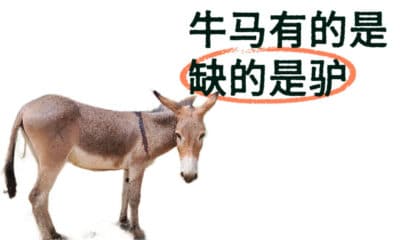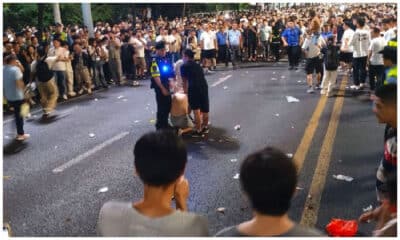China Media
“The Biden Era is Approaching”: Discussions of U.S.-China Relations under the ‘Sleepy King’
Now that the electoral storm has somewhat settled, the issue of what Sino-American might look like under Biden is much discussed in Chinese online media.
Published
5 years agoon

Now that the storm of jokes and memes surrounding the American elections has settled, more serious discussions regarding Biden’s win and what it might mean for China are surfacing in China’s online media environment. These commentators and academics approach the subject from different angles.
The American elections have been a major topic of discussion in the Chinese social media environment over the past weeks.
For many netizens on Weibo and beyond, the presidential race was one between the ‘King of Understanding’ (懂王, also ‘King of Knowing’) and the ‘Sleepy King’ (睡王).
Trump’s quotes on the things he knows and understands “more than anyone else” have become somewhat famous on Chinese social media (“people are really surprised I understand this stuff‘”), earning him the ‘King of Knowing’ nickname.

Trump’s nickname explained by Global Times.
Joe Biden got his nickname for dozing off during a speech and for an edited (fake) video that went viral in which Biden was seemingly falling asleep during a live interview.
But the Democrat has more nicknames on Chinese social media, including ‘Grandpa Bai’ (Bài yéyé 拜爷爷), or the cute ‘Dēngdēng‘ (登登).
His name in Chinese is usually written as (Bàidēng 拜登), although netizens have made up many more creative ways to write his name (拜灯, 白等, 败蹬).
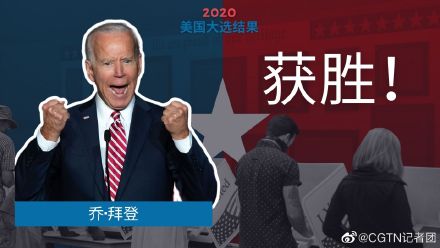
Now that it has become clear that former Vice President Joe Biden has won the 2020 US presidential race, Chinese media, bloggers, and netizens are reflecting on the Biden victory with a more serious tone, with the phrase “the Biden era is approaching” recurringly popping up on social media.
There are many articles and posts in China’s online media sphere that focus on Biden’s journey to the presidency, including how he faced family and personal tragedy during his political career.
But, as noted in our previous article on Chinese discussions on Trump versus Biden, most of the online articles and posts about the outcome of the American elections focus on what the shift in power might mean for China and Chinese–U.S. relations.
Over the past few days, Chinese media outlets have posted several interviews, op-eds, and videos of Chinese experts discussing the future prospects of Sino-American relations under Biden. We have selected some of these that have become popular on Weibo or news app Toutiao.
Hu Xijin: “The shift of American leadership has no intrinsic meaning for Sino-American relations.”
“Is anyone under the illusion that Biden’s rise to power will lead to a major U.S.-China détente? I’m certainly not. And neither is anyone in my circles, whether they’re journalists, academics, or officials.”
Hu Xijin (胡锡进), the editor-in-chief of the Global Times – a daily newspaper under the auspices of Party news outlet People’s Daily -, has over 23 million fans on his Weibo account. He frequently posts lengthy texts about his views on current news developments, both on Chinese social media as on Twitter (@HuXijin_GT). (For more about Hu Xijin, also check out this SupChina article.)

On November 9, Hu posted about the Biden win, writing:
“Along with China’s further development, America’s strategic precautions against China will only get heavier. China only needs its own continuously growing strength to draw a baseline for the United States in its relations with China. The shift of American leadership has no intrinsic meaning for Sino-American relations. I reckon this already is the general consensus of China’s mainstream society.”
This view, that it does not really matter whether Biden or Trump leads the U.S. for the next four years, was also reiterated in a recent blog post published by Global Times in which the author wrote: “Regardless if it’s the Democrats or the Republicans, both hold a negative stance when it comes to the China issue. (..) No matter who comes to power in the future, there is a high probability that they will continue to suppress China.”
In his November 9 post, Hu Xijin stressed that the outcome of the American elections is not of great significance for the status-quo of Sino-American relations, but he did add that Biden’s win might possibly positively affect the irregular patterns of current Sino-American relations. The political mistrust and power games that took place under the Trump presidency might make way for a period of U.S.-China relations that is less tense.
One of the most popular comments in response to Hu’s post basically summarized Hu’s message, writing: “America’s goal is to suppress China. The leaders might be different, the methods might not be the same, but the goal remains unchanged.”
Prof. Shen Yi: “It’s all for the betterment of the US – not for China.”
Shen Yi (沈逸) is the Associate Professor of the School of International Relations and Public Affairs at Fudan University. On Weibo, he has over 927,000 fans.

On November 10, Shen commented on Biden’s win through a video that was published on Chinese social media by The Observer (观察者).
Shen’s view is somewhat different than that of Hu. Instead of arguing that it does not matter whether Biden or Trump takes office, Shen argues that Chinese people should not mistake foreign politicians for friends, and remember that U.S.-China relations are all about power politics. Even though Chinese netizens sometimes warm up to American leaders like ‘Grandpa Bai’ (拜爷爷), and jokingly make them part of their daily discussions, their views of them should be more serious.
Shen says: “When the American media announced Biden’s victory, there were even some people in China who ‘shed tears of gratitude’, thinking that Sino-American relations will now get back on track.” But Shen gives a warning to those who sighed with relief about Biden’s win, saying: “You should not forget that Biden is a politician. He is an American politician. (..) He is not a Chinese leader.”
Shen suggests that even if Biden would relax some of the tougher China policies after he takes office, for example regarding trade or technology, he would only do so for the betterment of the U.S., not because it would help China. Trump put ‘America first’, but so will future U.S. leaders: “It’s all for themselves.”
Shen mentions that Chinese people should draw a lesson from China’s position during the Korean War and its ‘Resist America, Aid North Korea’ campaign, when China fought on Korean soil to counter ‘American aggression.’ In the worst-case scenario, he argues, China would again firmly stand ground against U.S. powers: “To combat American hegemony, we can only respond with the only language they can understand.”
Prof. Yao Yang: “It’s impossible to go back to how U.S.-China relations used to be.”
“During Trump’s four years in office, he’s established a political heritage that can’t be immediately erased – including the worsened relations between the U.S. and China. If Biden takes power, will there be a shift in Sino-American relations?”
Yao Yang (姚洋) is the dean and professor at the National School of Development of Peking University. He previously also taught at the University of Washington and New York.
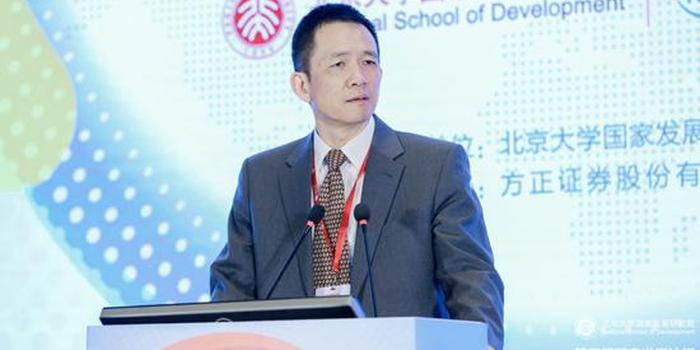
In a recent op-ed for Beijing News, the professor writes that in these initial discussions of what Biden’s office might mean for the future of the relations between Beijing and Washington, it must first be acknowledged that Chinese-U.S. relations will never go back to how they used to be.
Whereas Hu took a stance from the perspective of the people, and Shen discussed the upcoming Biden era from the stance of international power relations, Yang approaches the subject through a more historical lens.
Yang argues that the tensions between China and the U.S. did not start with Trump. Obama’s “pivot to Asia” strategy, which tried to peacefully contain China’s ambitions, disrupted the general tranquility that existed before 2008. “China started to be seen as a rival,” Yang writes, adding that this idea of the U.S. and China being geopolitical competitors was continued under Trump and is expected to remain the same under Biden.
Looking back at half a century of U.S.-China relations, Yang claims that the friendly relations between the two countries in the 1970s and 1980s were because of the changing relations with the Soviet-Union and that the U.S. policy of engagement with China from the 1990s to 2010 was based on the hope that China would become more like the United States.
When, around 2010, it became clear to the U.S. elite and leadership that China was not going to be Americanized and that the Chinese path to development was actually successful, the response was one of resentment. Yang asserts that the China policies during the four years under Trump show this angry response towards a China that has taken a different route than America had hoped for during the decades preceding 2010.
Does this mean that nothing will change for U.S.-China relations under Biden? Not necessarily so. Although the two countries will remain to have a competitive relationship, Yang does expect China and the U.S. to have more peaceful relations under the administration of Biden, which will shift away from Trump’s “Cold War mentality” towards China.
Zheng Yongnian: “Biden’s China Policy will be much more predictable.”
An interview with Chinese political scientist and political commentator Zheng Yongnian (郑永年) was posted by 21st Century Business Herald (21世纪经济报道) on November 11, focusing on American politics and Biden.
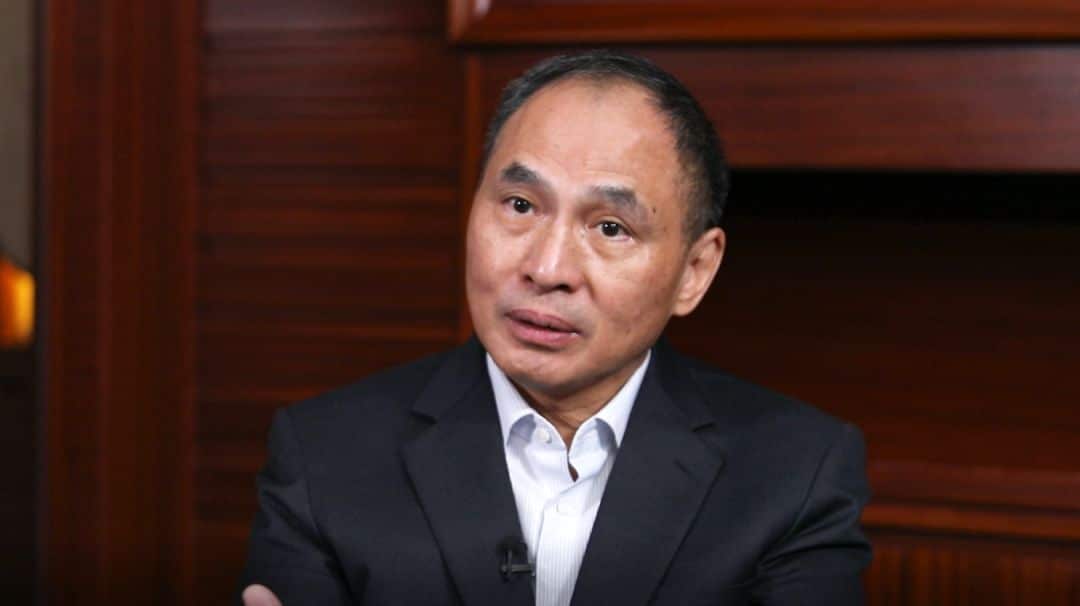
Zheng holds similar views on the upcoming Biden era as the other commentators mentioned in this article, namely that the general state of China-US relations will not be drastically changed when Biden comes to power.
Zheng does stress, however, that Biden’s win might have a positive impact on the international community at large, bringing more rationality and an intention to cooperate. In that regard, the Biden era will probably be more similar to the Obama presidency, Zheng says.
Although no major changes are expected under Biden when it comes to U.S.-China relations, Zheng does assert that Biden’s win is positive for Chinese leadership because this president will be much more predictable than Donald Trump.
“Biden’s foreign policy will probably be a basic continuation of the Obama era. So of course there will be some change in Sino-American relations. There’s no fear of hard-line [policies], there are mainly worries about unpredictability. Trump would constantly create these black swans, there’s just no way to predict it. The predictability of the Biden team will be stronger than that of Trump.”
More from What’s on Weibo on China–United States relations here.
By Manya Koetse
Follow @WhatsOnWeibo
Spotted a mistake or want to add something? Please let us know in comments below or email us. First-time commenters, please be patient – we will have to manually approve your comment before it appears.
©2020 Whatsonweibo. All rights reserved. Do not reproduce our content without permission – you can contact us at info@whatsonweibo.com.
Manya is the founder and editor-in-chief of What's on Weibo, offering independent analysis of social trends, online media, and digital culture in China for over a decade. Subscribe to gain access to content, including the Weibo Watch newsletter, which provides deeper insights into the China trends that matter. More about Manya at manyakoetse.com or follow on X.

You may like
China Media
China’s “AFP Filter” Meme: How Netizens Turned a Western Media Lens into Online Patriotism
Chinese netizens embraced a supposed “demonizing” Western gaze in AFP photos and made it their own.
Published
4 weeks agoon
September 10, 2025By
Ruixin Zhang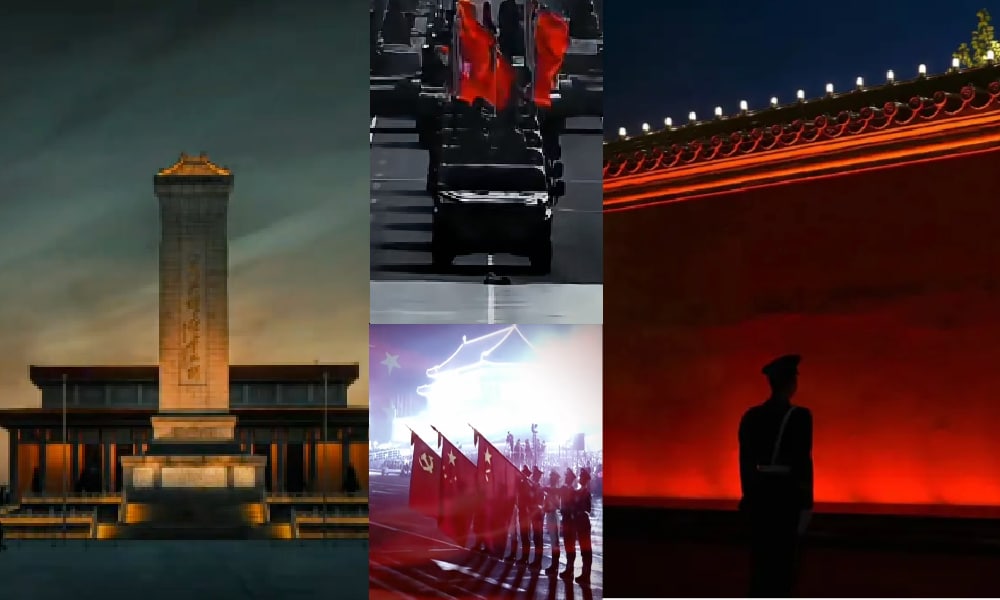
For a long time, Chinese netizens have criticized how photography of Chinese news events by Western outlets—from BBC and CNN to AFP—makes China look more gloomy or intimidating. During this year’s military parade, the so-called “AFP filter” once again became a hot topic—and perhaps not in the way you’d expect.
In the past week following the military parade, Chinese social media remained filled with discussions about the much-anticipated September 3 V-Day parade, a spectacle that had been hyped for weeks and watched by millions across the country.
That morning, Chinese leader Xi Jinping, accompanied by his wife Peng Liyuan, welcomed international guests on the red carpet. When Xi arrived at Tiananmen Square alongside Russian President Vladimir Putin and North Korean leader Kim Jong-un, office phone calls across the country quieted, and school classes paused to tune in to one of China’s largest-ever military parades along Chang’an Avenue in Beijing, held to commemorate China’s victory over Japan in the Second Sino-Japanese War and World War II.
As tanks rolled and jets thundered overhead, and state media outlets such as People’s Daily and Xinhua livestreamed the entire event, many different details—from what happened on Tiananmen Square to who attended, and what happened before and after, both online and offline—captured the attention of netizens.
Amid all the discussions online, one particularly hot conversation was about the visual coverage of the event, and focused on AFP (法新社), Agence France Press, the global news agency headquartered in Paris.
Typing “AFP” (法新社) into Weibo in the days after the parade pulled up a long list of hashtags:
- Has AFP released their shots yet?
- V-Day Parade through AFP’s lens
- AFP’s god-tier photo
- Did AFP show up for the parade?
The fixation may seem odd—why would Chinese netizens care so much about a French news agency?

Popular queries centered on AFP.
The story actually goes back to 2022.
In July of that year, on the anniversary of the Communist Party’s founding, one Weibo influencer (@Jokielicious) noted that while domestic photographers portrayed the celebrations as bright and triumphant, she personally preferred the darker, almost menacing image of Beijing captured by Western journalists. In her view, through their lens, China appeared more powerful—even a little terrifying.
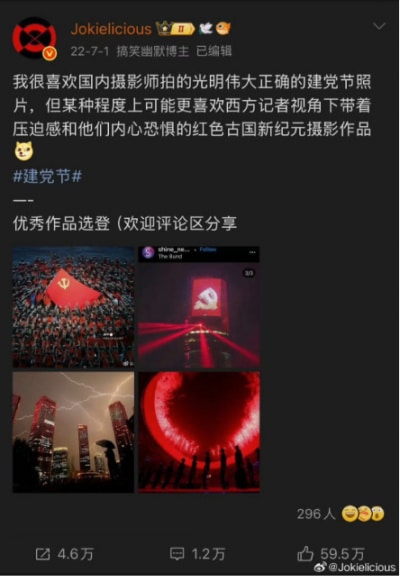
The original post.
The post went viral. Soon, netizens began comparing more of China’s state media photos with those from Western outlets. One photo in particular stood out: Xinhua’s casual, cheerful shot of Chinese soldiers contrasted sharply with AFP’s cold, almost cinematic frame.
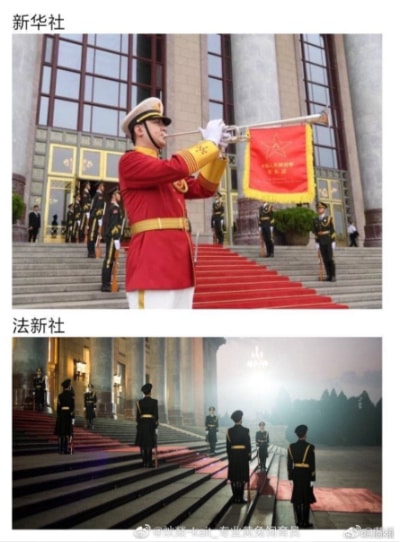
Same event, different vibe. Chinese social media users compared these photos of Xinhua (top) versus AFP (down). AFP photo shot by Fred Dufour.
Netizens joked that Xinhua had made the celebration look like the opening of a new hotel, while AFP had cast it as “the dawn of an empire.”
Gradually, what began as a dig at the bad aesthetics of state media turned into something else: a subtle shift in how Chinese netizens were rethinking their country’s international image.
Under the hashtag #ChinaThroughOthersLens (#老中他拍), netizens shared images of China as seen through the lenses of various Western media outlets.
This wasn’t the first time such talk had appeared. In the early days of the Chinese internet, people often spoke of the so-called “BBC filter.” The idea was that the BBC habitually put footage of China under a grayish filter, making its visuals give off a vibe of repression and doom, which many felt was at odds with the actual vibrancy on the ground. To them, it was proof that the West was bent on painting China as backward and gloomy.
These discussions have continued in recent years.
For example, on Weibo there were debates about a photo of the Wuhan Institute of Virology, shot by Peter Thomas for Reuters, and used in various Western media reports about Wuhan and Covid as early as 2021. The top image shows the photographer’s vantage point.
“Looks like a cockroach in the gutter,” one popular comment described it.

Top image by Chinese media, lower image by Peter Thomas/Reuters, and was used in various Western media reports about Wuhan and Covid since as early as 2021.
Another example is the alleged “smog filter” applied by Western media outlets to Beijing skies during the China visit of US Secretary of State Antony Blinken in 2024.
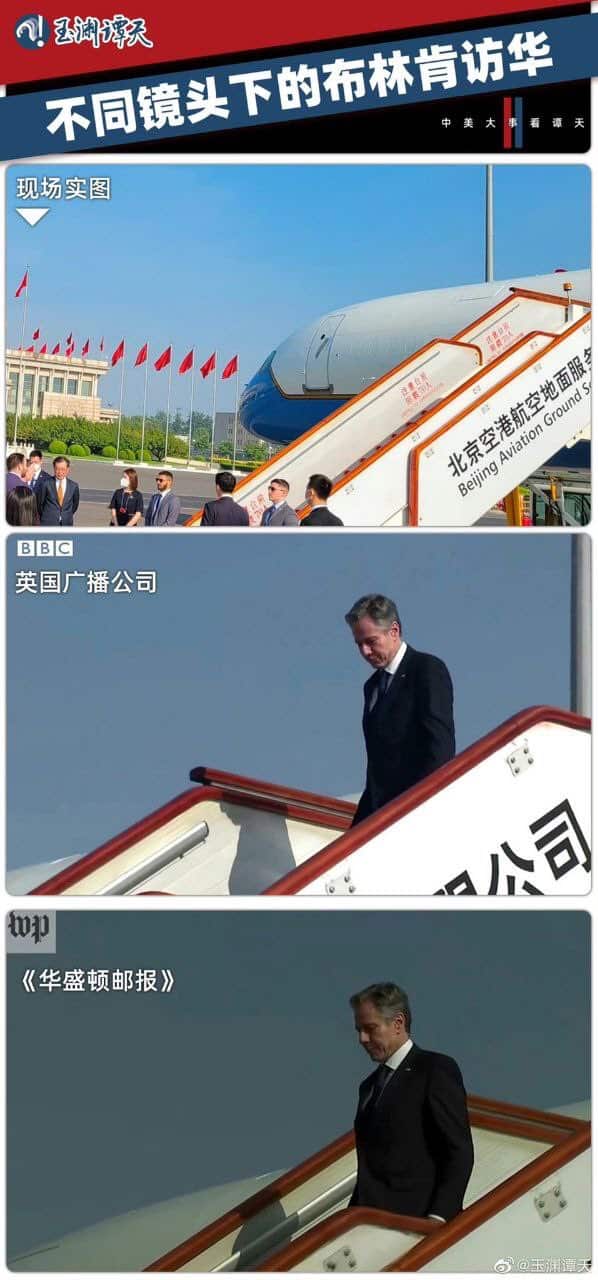
The alleged “smog filter” applied to Beijing skies during Blinken’s visit. Top image: Chinese media. Middle: BBC. Lower: Washington Post.
AFP, meanwhile, seemed to offer a different kind of ‘distortion.’
Netizens said AFP’s photos often had a low-saturation, high-contrast, solemn tone, with wide angles that made the scenes feel oppressive yet majestic. Over time, any photo with that look—whether taken by AFP or not—was dubbed the “AFP filter” (法新社滤镜).
AFP has clarified multiple times that many of the viral examples weren’t even theirs—or that they were, but had been altered with an extra dark filter. They also refuted claims that AFP had published a photo series of Chinese soldiers titled “Dawn of Empire” to discredit China’s army.
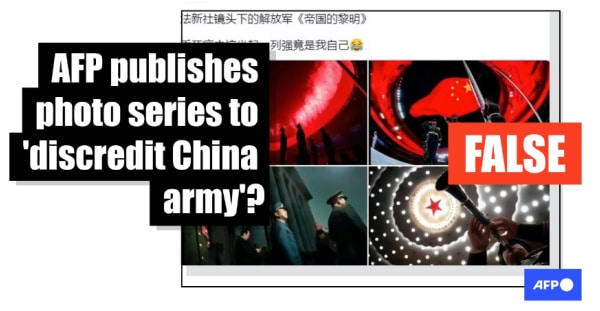
AFP refuted claims that their photos discredited the Chinese army.
Nevertheless, the “AFP filter” label stuck. It became shorthand for a Western gaze that cast China not as impoverished or broken—as some claimed the “BBC filter” did—but as formidable, like a looming supervillain.
One running joke summed it up neatly: domestic shots are the festive version; Western shots are the red-tyrant version. And increasingly, netizens admitted they preferred the latter, commenting that while AFP shots often emphasize red to suggest authoritarianism, they actually like the red and what it stands for.
So, when this year’s V-Day came around, many were eager to see how AFP and other Western outlets would frame China as the dark, dangerous empire.
But when the photos dropped, the reaction was muted. They looked average. Some called them “disappointing.” “Where are the dark angles? Not doing it this time?” one blogger wondered. “Where’s the AFP hotline? I’d like to file a complaint!”
“Xinhua actually beat you this time,” some commented on AFP’s official Weibo account. Others agreed, putting the AFP photos and Xinhua photos side by side.
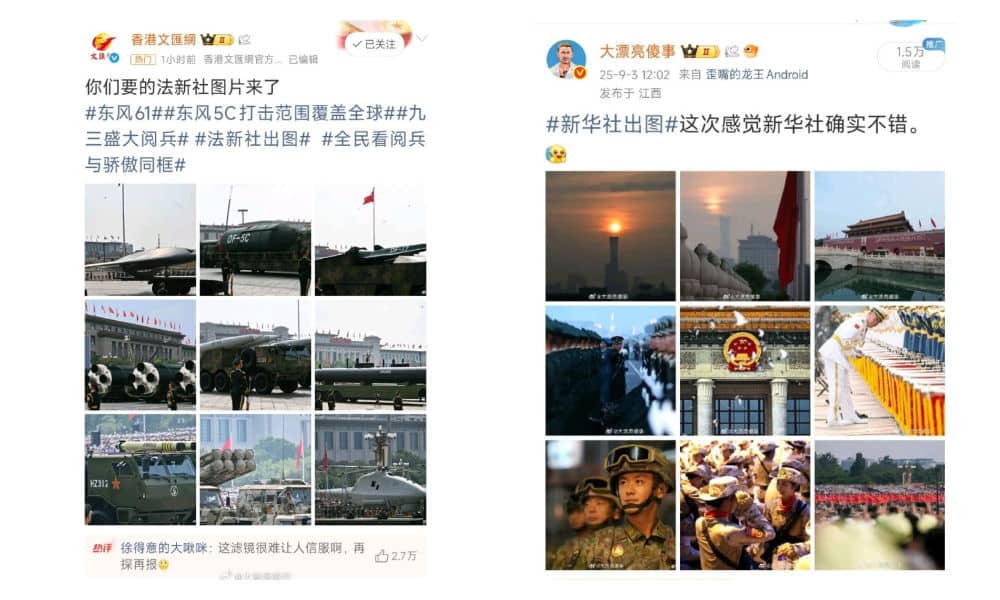
AFP photos on the left versus Xinhua photos on the right.
To make up for the letdown, people began editing the photos themselves—darkening the tones, adding dramatic shadows, and proudly labeling them with the tag “AFP filter” or calling it “The September 3rd Military Parade Through a AFP Lens” (法新社滤镜下的9.3阅兵). “Now that’s the right vibe,” they said: “I fixed it for you!”

Netizen @哔哔机 “AFP-fied” photos of the military parade by AFP.
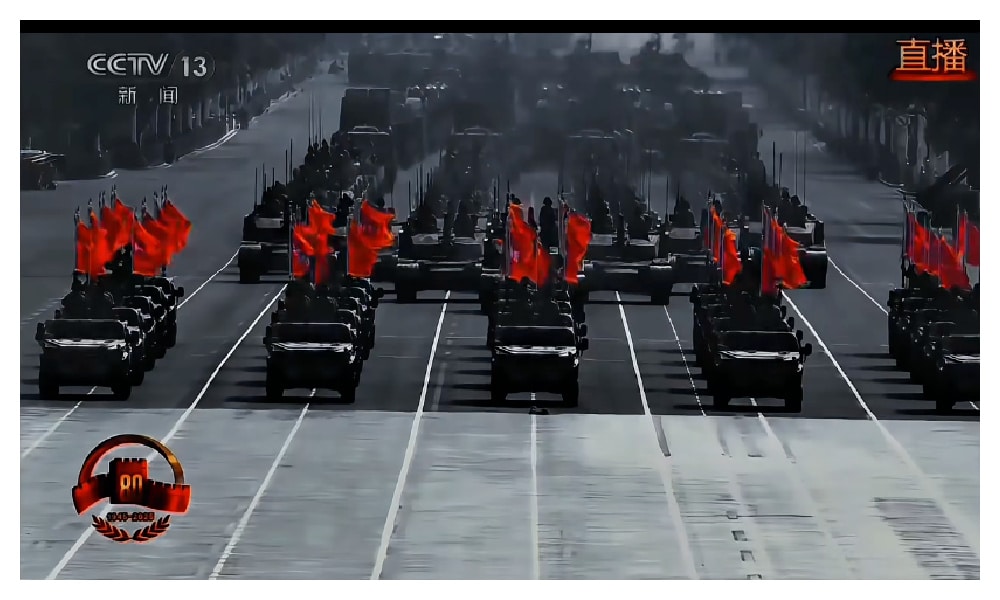
Official media quickly picked up on the trend. Xinhua rolled out its own hashtags—#XinhuaAlwaysDeliversEpicShots (#新华社必出神图的决心#) and #XinhuaWins (#新华社秒了#)—and positioned itself as the true master of a new aesthetic narrative.
The message was clear: China no longer needs the Western gaze to frame itself as powerful or intimidating; it can do that on its own.
The “AFP v Xinhua” contest, the online movement to “AFP-ify” visuals, and the Chinese fandom around AFP’s moodier shots may have been wrapped in jokes and memes, but they also pointed to something deeper: the once “demonized” image of China that Western media pushed as threatening is now not only accepted by Chinese netizens, it’s embraced. Many have made it part of a confident, playful form of online patriotism, applauding the idea of being seen by the West as fearsome, even villainous, believing it amplifies China’s global authority.
As one netizen wrote: “I like it when we look like we crawl straight into their nightmares.”
Chinese journalist Kai Lei (@凯雷) suggested that these kinds of trends showed how the Chinese public plays an increasingly proactive role in shaping China’s global image.
By now, the AFP meme has become so strong that it doesn’t even require AFP anymore. Ultra-dramatic shots are simply called “AFP-level photos” (法新社级别).
For now, as many are enjoying the “afterglow” of the military parade, their appreciation for the AFP-style only seems to grow. As one Weibo user summed it up: “AFP tried to create a sense of oppression with dark, low-angle shots, but instead only strengthened the Chinese military’s aura of majesty.”
– By Ruixin Zhang and Manya Koetse
Spotted a mistake or want to add something? Please let us know in comments below or email us. First-time commenters, please be patient – we will have to manually approve your comment before it appears.
©2025 Whatsonweibo. All rights reserved. Do not reproduce our content without permission – you can contact us at info@whatsonweibo.com.
China Arts & Entertainment
Yearnings, Dreamcore, and the Rise of AI Nostalgia in China
From China’s first soap opera Yearnings to the rise of AI-fueled nostalgia.
Published
3 months agoon
July 2, 2025
The year is 1990, and the streets of Beijing’s Fangshan District are eerily quiet. You can almost hear a pin drop in the petrochemical town, as tens of thousands of workers and their families huddle around their televisions, all tuned to the same channel for something groundbreaking: China’s very first soap opera, Yearnings (渴望 Kěwàng).
Yearnings tells the story of Liu Huifang (刘慧芳), a female factory worker from a traditional working-class family in Beijing, and her unlikely marriage to university graduate Wang Husheng (王沪生), who comes from a family of intellectuals. When Liu finds an abandoned baby girl, she adopts her and raises her as her own, against her husband’s wishes.
The couple is unaware that the foundling is actually the illegitimate child of Wang’s snobbish sister, Yaru. After Liu and Wang have a biological son, the marriage comes under further pressure, eventually leading to divorce. Liu is left as a single mother, raising two children on her own.
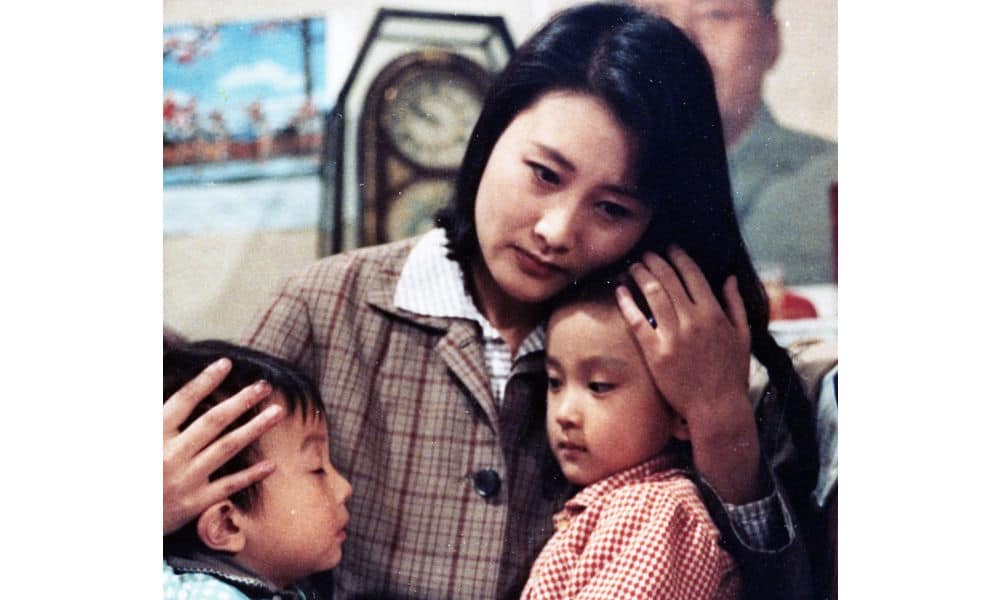
Still from Yearnings, via OurChinaStory.
Drawing inspiration from foreign dubbed television shows, Yearnings was produced as China’s first truly domestic, long-form indoor television drama. Spanning 50 episodes, the series traces a timeline from the onset of the Cultural Revolution in the 1960s through to the late 1980s—one of the most turbulent periods in modern Chinese history.
Before the series aired nationally on CCTV and achieved record viewership, the first station to air Yearnings in the Beijing region was the Yanshan Petrochemical TV Station (燕山石化电视台), China’s first major factory TV station (厂办电视台) located in Fangshan District.
Here, in this town of over 100,000, Yearnings garnered an astonishing and unprecedented 98% audience share. The series was truly groundbreaking and became a national sensation—not just because it was China’s first long-form television drama, or because it was a locally produced drama that challenged the long-standing monopoly of state broadcaster CCTV, but because Yearnings marked a major shift in television storytelling.
Until then, Chinese TV stories had always revolved around communist propaganda, or featured great heroes of the revolution. Yearnings, on the other hand, was devoid of political content and focused on the hopes and dreams of ordinary people and their everyday struggles—love, desire, marital tension, single motherhood—topics that had never before been so openly portrayed on Chinese television.
The show’s creators had perfectly tapped into what was changing: the Communist Party was slowly withdrawing from private life, and people were beginning to see themselves less defined by their work unit and more by their home life—as consumers, as partners and parents, as citizens of a new China filled with aspirations for the future. Yearnings’ storyline was a reflection of that.
Chinese-Style “Nostalgia Core”
Yearnings marked a cultural turning point, coinciding with the rapid spread of TV sets in Chinese households. In 1992, economic reforms triggered a new era in which Chinese media became increasingly commercialized and thriving, before the arrival of the internet, social media, and AI tools once again changed everything.
Today, Yearnings still is a topic that often comes up in Chinese online media. On apps like Douyin, old scenes from Yearnings are reposted and receive thousands of shares.
📌 It’s emblematic of a broader trend in which more netizens are turning to “nostalgia-core.” In Chinese, this trend is known as “中式梦核” (Zhōngshì Mènghé), which literally means “Chinese-style dreamcore.”
Dreamcore is an internet aesthetic and visual style—popular in online communities like Tumblr and Reddit—that blends elements of nostalgia, surrealism, and subconscious imagery. Mixing retro images with fantasy, it evokes a sense of familiarity, yet often feels unsettling and deserted.
The Chinese-style dreamcore (中式梦核), which has become increasingly popular on platforms like Bilibili since 2023-2024, is different from its Western counterpart in how it incorporates distinctly Chinese elements and specifically evokes the childhood experiences of the millennial generation. Content tagged as “Chinese-style dreamcore” on Chinese social media is often also labeled with terms like “nostalgia” (怀旧), “childhood memories” (童年回忆), “when we were little” (小时候), and “Millennial Dream” (千禧梦).
According to the blogging account Yatong Local Life Observer (娅桐本地生活观察), the focus on the millennial childhood can be explained because the formative years of this generation coincided with a decade of rapid social change in China —leaving little in today’s modern cities that still evokes that era.
🌀 Of course, millennials in the West also frequently look back at their childhood and teenage years, particularly the 1980s and 1990s—a trend also embraced by Gen Z, who romanticize these years through media and fashion. In China, however, Gen Z is at the forefront of the “nostalgia-core” trend, reflecting on the 1990s and early 2000s as a distant, almost dreamlike past. This sense of distance is heightened by China’s staggering pace of transformation, modernization, and digitalization over the past decades, which has made even the recent past feel remote and irretrievable.
🌀 Another factor contributing to the trend is that China’s younger generations are caught in a rat race of academic and professional competition, often feeling overwhelmed by the fast pace of life and the weight of societal expectations. In this high-pressure environment—captured by the concept of “involution” (内卷)—young people develop various coping mechanisms, and digital escapism, including nostalgia-core, is one of them. It’s like a cyber-utopia (赛博乌托邦).
🌀 Due to the rise of AI tools available to the general public, Chinese-style nostalgia core has hit the mainstream because it’s now possible for all social media users to create their own nostalgic videos and images—bringing back the 1990s and early 2000s through AI-generated tools, either by making real videos appear more nostalgic or by creating entirely fictional videos or images that recreate scenes from those days.
So what are we seeing? There are images and videos of stickers kids used to love, visuals showing old classrooms, furniture, and children playing outside, accompanied by captions such as “we’re already so far apart from our childhood years” (example).

Images displayed in Chinese Dreamcore.
And notably, there are videos and images showing family and friends gathering around those old big TVs as a cultural, ritualized activity (see some examples here).

Stills from ‘nostalgia core’ videos.
These kinds of AI-generated videos depict a pre-mobile-era family life, where families and communities would gather around the TV—both inside and outside—from classrooms to family homes. The wind blows through the windows, neighbors crack sunflower seeds, and children play on the ground. Ironically, it’s AI that is bringing back the memories of a society that was not yet digitalized.
Nowadays, with dozens of short video apps, streaming platforms, and livestream culture fully mainstream in China—and AI algorithms personalizing feeds to the extreme—it sometimes feels like everyone’s on a different channel, quite literally.
In times like these, people long for an era when life seemed less complicated—when, instead of everyone staring at their own screens, families and neighbors gathered around one screen together.
There’s not just irony in the fact that it took AI for netizens to visualize their longing for a bygone era; there’s also a deeper irony in how Yearnings once represented a time when people were looking forward to the future—only to find that the future is now looking back, yearning for the days of Yearnings.
It seems we’re always looking back, reminiscing about the years behind us with a touch of nostalgia. We’re more digitalized than ever, yet somehow less connected. We yearn for a time when everyone was watching the same screen, at the same time, together, just like in 1990. Perhaps it’s time for another Yearnings.
By Manya Koetse
(follow on X, LinkedIn, or Instagram)
Sources (other sources included in hyperlinks)
Koetse, Manya. 2016. “From Woman Warrior to Good Wife – Confucian Influences on the Portrayal of Women in China’s Television Drama.” In Stefania Travagnin (ed), Religion and Media in China. New York: Routledge.
Rofel, Lisa B. 1994. Yearnings: Televisual Love and Melodramatic Politics in Contemporary China. American Ethnologist 21(4):700-722.
Wang, Dan (汪丹). 2018. “《渴望》的艺术价值” [The Artistic Value of Yearnings].” Originally published in Beijing Daily (北京日报), October 12, 2018. Reprinted in Digest News (文摘报), October 20, 06 edition. Also see Sohu: 当年红遍大江南北的《渴望》.
Wang Min and Arvind Singhal. 1992. “Kewang, a Chinese television soap opera with a message.” Gazette 49: 177-192.
Zhuge Kanwu. 2021. “重温1990《渴望》:苦得“刘慧芳”希望被导演写“死” [Revisiting 1990’s Yearnings: The Suffering Liu Huifang Hoped to Be Written Off by the Director]. Zhuge Dushu Wu (诸葛读书屋), January 22. https://wapbaike.baidu.com/tashuo/browse/content?id=b699ee532cf79f862bfa14ad.
Spotted a mistake or want to add something? Please let us know in comments below or email us. First-time commenters, please be patient – we will have to manually approve your comment before it appears.
©2025 Whatsonweibo. All rights reserved. Do not reproduce our content without permission – you can contact us at info@whatsonweibo.com.
Subscribe
What’s on Weibo is a reader-supported publication, run by Manya Koetse (@manyapan), offering independent analysis of social trends in China for over a decade. To receive new posts and support our work, consider becoming a paid subscriber.

Get in touch
Would you like to become a contributor, or do you have any tips or suggestions? Get in touch here!

China Faces Unprecedented Donkey Shortage Crisis

Nanchang Crowd Confuses Fan for Knife — Man Kicked Down and Taken Away

The Wong Kar-wai Scandal Explained: The Dark Side of ‘Blossoms Shanghai’

China’s National Day Holiday Hit: Jingdezhen’s “Chicken Chop Bro”

Evil Unbound (731): How a Chinese Anti-Japanese War Film Backfired

Hidden Cameras and Taboo Topics: The Many Layers of the “Nanjing Sister Hong” Scandal

“Jiangyou Bullying Incident”: From Online Outrage to Offline Protest

The Rising Online Movement for Smoke-Free Public Spaces in China

China Trend Watch: Pagoda Fruit Backlash, Tiananmen Parade Drill & Alipay Outage (Aug 11–12)

From Schadenfreude to Sympathy: Chinese Online Reactions to Charlie Kirk Shooting
Popular Reads
-

 China Memes & Viral3 months ago
China Memes & Viral3 months agoHidden Cameras and Taboo Topics: The Many Layers of the “Nanjing Sister Hong” Scandal
-

 China Books & Literature11 months ago
China Books & Literature11 months agoThe Price of Writing Smut: Inside China’s Crackdown on Erotic Fiction
-

 China Insight5 months ago
China Insight5 months agoUnderstanding the Dr. Xiao Medical Scandal
-

 China Memes & Viral9 months ago
China Memes & Viral9 months agoOur Picks: Top 10 Chinese Buzzwords and Phrases of 2024 Explained

